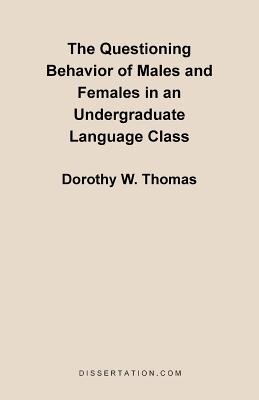
- We will send in 10–14 business days.
- Author: Dorothy W Thomas
- Publisher: Dissertation.Com. - Do Not Use
- Year: 2001
- Pages: 148
- ISBN-10: 1581121180
- ISBN-13: 9781581121186
- Format: 13.9 x 21.2 x 1 cm, minkšti viršeliai
- Language: English
- SAVE -10% with code: EXTRA
The Questioning Behavior of Males and Females in an Undergraduate Language Class (e-book) (used book) | bookbook.eu
Reviews
Description
The purpose of this study is to examine the questioning behavior of males and females in an undergraduate Speech class. Whether one is analyzing social, mental, emotional, or verbal behavior of students, biological sex is usually a factor.
This study describes differences between male and female questioning and discusses the implications of these differences for classroom teaching.
The classroom is a small society with its own special language, a language that contributes to classroom events. Student questioning, a behavior that provides information on how students adapt and function within the classroom, is an important part of the student learning repertoire.
Although researchers have devoted much attention to teacher questioning, they have devoted little attention to male/female questioning in the college classroom. This qualitative study gathers data in the form of direct observation, field notes, coding of students' questions, journals, and audio-taping over a period of two months [thirteen observations].
My findings revealed no differences between males and females on the types of questions they asked. Males, however, asked more questions overall than females.
This study offers suggestions for further research.
EXTRA 10 % discount with code: EXTRA
The promotion ends in 22d.00:41:34
The discount code is valid when purchasing from 10 €. Discounts do not stack.
- Author: Dorothy W Thomas
- Publisher: Dissertation.Com. - Do Not Use
- Year: 2001
- Pages: 148
- ISBN-10: 1581121180
- ISBN-13: 9781581121186
- Format: 13.9 x 21.2 x 1 cm, minkšti viršeliai
- Language: English English
The purpose of this study is to examine the questioning behavior of males and females in an undergraduate Speech class. Whether one is analyzing social, mental, emotional, or verbal behavior of students, biological sex is usually a factor.
This study describes differences between male and female questioning and discusses the implications of these differences for classroom teaching.
The classroom is a small society with its own special language, a language that contributes to classroom events. Student questioning, a behavior that provides information on how students adapt and function within the classroom, is an important part of the student learning repertoire.
Although researchers have devoted much attention to teacher questioning, they have devoted little attention to male/female questioning in the college classroom. This qualitative study gathers data in the form of direct observation, field notes, coding of students' questions, journals, and audio-taping over a period of two months [thirteen observations].
My findings revealed no differences between males and females on the types of questions they asked. Males, however, asked more questions overall than females.
This study offers suggestions for further research.


Reviews